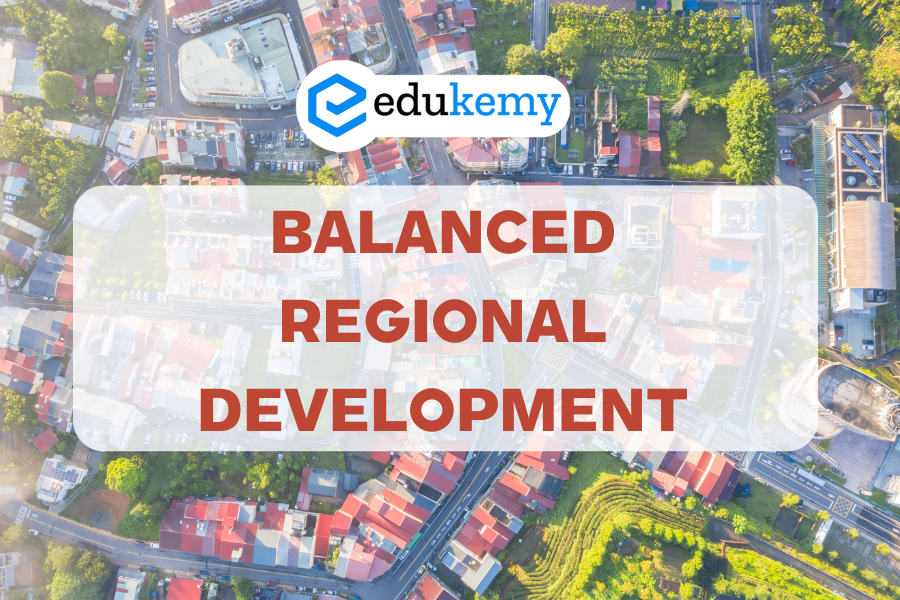Learn about Balanced Regional Development, its significance, strategies, challenges, and role in fostering equitable and sustainable development across regions.
Contents
- 1 Introduction
- 2 Understanding Regional Disparities
- 3 Check Shabbir Sir’s Class Notes
- 4 Strategies for Balanced Regional Development
- 5 Case Studies
- 6 Role of Geography in Regional Development
- 7 Challenges in Achieving Balanced Regional Development
- 8 Conclusion
- 9 To get free counseling/support on UPSC preparation from expert mentors please call 9773890604
Introduction
Balanced regional development refers to the equitable distribution of economic, social, and infrastructural resources across different regions of a country. This concept holds immense significance in addressing regional disparities and ensuring sustainable development. For students of geography, particularly those preparing for competitive exams like the UPSC, understanding balanced regional development is essential as it intersects various aspects of human geography, economic planning, and public policy.
Understanding Regional Disparities
Regional disparities occur when certain areas within a country experience higher levels of development while others lag. These disparities can manifest in terms of income, employment opportunities, infrastructure, education, healthcare, and overall quality of life. For example, the western and southern states of India, such as Maharashtra, Gujarat, Tamil Nadu, and Karnataka, have historically witnessed higher economic growth compared to the eastern and northern states like Bihar, Odisha, and Uttar Pradesh.
Check Shabbir Sir’s Class Notes
Click Here to download
Strategies for Balanced Regional Development
- Spatial Planning: Identifying and promoting growth centers in underdeveloped regions through integrated spatial planning.
- Special Economic Zones (SEZs): Establishing SEZs in backward regions to attract investment and create employment opportunities.
- Infrastructure Development: Prioritizing the development of transport, power, and communication networks in lagging regions.
- Decentralized Governance: Empowering local bodies through Panchayati Raj institutions to address region-specific issues effectively.
- Sectoral Diversification: Promoting non-farm employment opportunities in agriculture-dependent regions.
- Education and Skill Development: Enhancing human capital through quality education and skill development initiatives.
Case Studies
- Bengaluru: A Growth Pole Bengaluru emerged as a major IT hub due to targeted policies, skilled workforce, and robust infrastructure. However, this has also led to intra-state disparities in Karnataka, necessitating measures to spread growth to other parts of the state.
- Eastern and North-Eastern India The Aspirational Districts Programme in India aims to bridge regional inequalities by focusing on key indicators like health, education, and infrastructure in underdeveloped districts.
- Chhattisgarh and Jharkhand Rich in mineral resources, these states have not been able to translate their resource wealth into sustainable development due to governance issues and socio-political challenges.
Role of Geography in Regional Development
Geographers play a crucial role in analyzing spatial patterns of development and suggesting strategies for balanced growth. Techniques like Geographic Information Systems (GIS) and Remote Sensing help in mapping regional disparities and planning interventions.
Challenges in Achieving Balanced Regional Development
- Policy Implementation: Lack of coordination among various government departments.
- Resource Constraints: Financial limitations hinder large-scale infrastructure projects.
- Social Resistance: Relocation and land acquisition for developmental projects often face opposition.
- Environmental Concerns: Balancing development with ecological sustainability is a critical challenge.
Conclusion
Balanced regional development is not just a goal but a necessity for fostering national integration, reducing social unrest, and achieving sustainable development. For geography students, understanding the dynamics of regional development offers valuable insights into the interconnectedness of economic activities, human welfare, and spatial planning. By addressing regional disparities, nations can move closer to the ideal of equitable and inclusive growth, ensuring that no region or community is left behind.
To get free counseling/support on UPSC preparation from expert mentors please call 9773890604
- Join Geography Optional Course – Click Here
- Get Geography Hard Copy notes – Click Here

